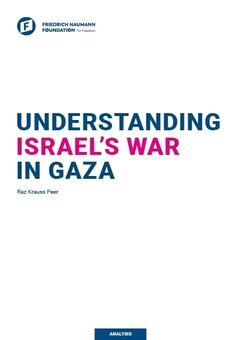Israel
The Day after (the War)
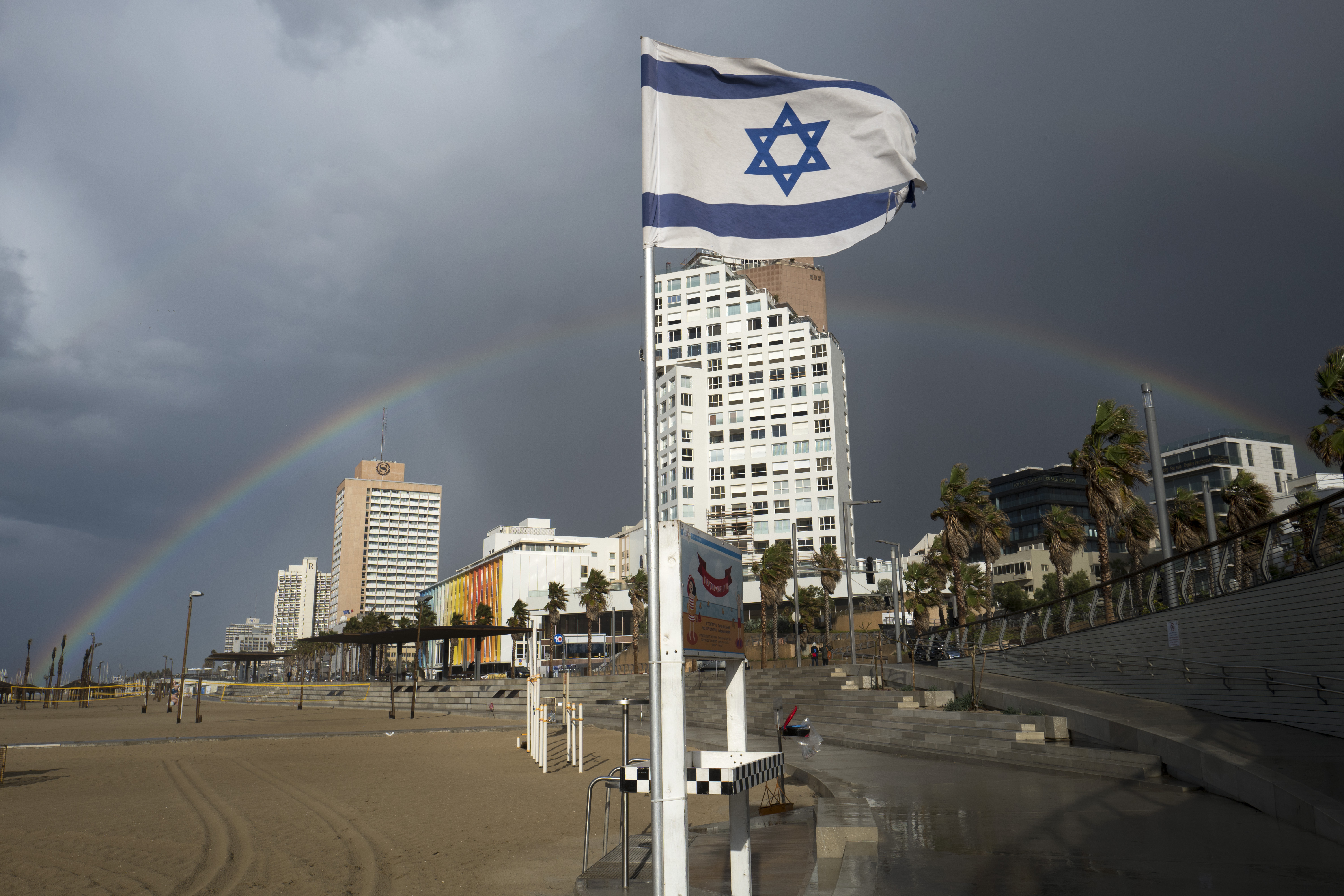
A rainbow forms along the Mediterranean Sea beachfront in Tel Aviv
© picture alliance/EPA-EFE | JIM HOLLANDER
The Calculation of Hamas and its consequences
Hamas had started working on its diabolic plan of invading Israel and murdering its civilians in cold blood a while ago, probably more than a year. It aimed at changing the status quo between Israel, Gaza and the West Bank, hoping to release as many Palestinian prisoners as possible. Hamas leaders had what they thought was a bullet-proof plan: the war in Gaza will galvanize the West Bank and bring down the regime of Mahmoud Abbas, and will drive the Arab citizens of Israel to open a domestic front. Iran will support Gaza through its proxies in Lebanon, Iraq, Syria and Yemen, while the Arab countries will be forced to cut relations with Israel by angry pro-Palestinian crowds, ending the Abraham Accords, as well as previously signed peace treaties.
Arab citizens of Israel didn’t respond to the plight of Hamas and in fact feel more Israeli than ever before

The reaction of Arab citizens of Israel
Two months into the war it seems that Hamas heavily miscalculated in most of these aspects: the situation in the West Bank remains very troubling indeed and it might worsen before the end of the year. However, the Arab citizens of Israel didn’t respond to the plight of Hamas and in fact feel more Israeli than ever before, while the main Iranian proxy, Hezbollah, has chosen to excuse itself with a limited scope of military activities. The all-out war that Hamas was dreaming of didn’t happen. As to moderate Arab countries that maintain ties with Israel, the overwhelming majority refused to play into the hands of Hamas and has chosen not to break strategic relations with Israel.
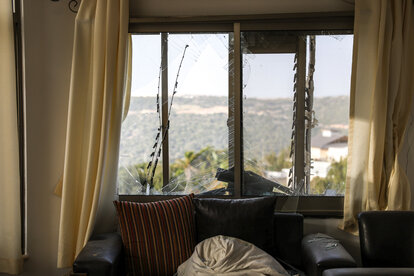
Ein beschädigtes Gebäude in Shtula im Norden Israels nach einem Angriff der Hisbollah aus dem Libanon, Jan. 9, 2024.
© picture alliance / Xinhua News Agency | David Coheng
Egypt and Jordan already faced this kind of situation before: the first Israel-Lebanon war erupted just three years following the Peace treaty between Egypt and Israel and was met with rage by the Egyptian society. Jordan also had to contain angry public reactions when the al-Aqsa Intifada started in September, 2000. Back in 2000’s, following a violent outbreak in Gaza and the West Bank, most of the Arab countries that were in the process of normalization with Israel, such as Tunisia and Bahrain, decided to cut their ties. There were no official embassies or treaties and the withdrawal was quick and abrupt (interestingly, the Israeli trade office in Qatar continued to operate until 2009).
The Gaza-conflict as a test to the Abraham Accords
The war in Gaza was therefore a sort of a resilience test for the Abraham Accords. This time around the Gulf countries made a different choice: they vehemently criticized Israel, but also rebuked Hamas while maintaining diplomatic, security and commercial relations with Jerusalem. The planes continued flying from Ben-Gurion airport to Dubai and Abu-Dhabi, the embassies were not closed, and the ambassadors not officially called back. So, the frame of the relations remained intact, but according to many Israeli businessman and diplomats, many contracts were put on hold and new deals were not signed as the Abraham Accords countries tried to balance between supporting Palestinian civilians and maintaining their vital interests. As usual, the countries who have a common border with Israel and a history of past wars, made bolder statements and took harsher decisions. Jordan, for example, decided to recall its ambassador from Israel, an expected move that was already undertaken by Amman in the recent past.
Many Arab countries certainly fume over the war in Gaza. They protest the high numbers of civilian deaths and the delays in bringing in humanitarian aid. They worry about the regional consequences and the rising popularity of Hamas as well as other radical Islamic movements at home. And yet, despite their criticism they maintain their strategic relations with Israel, as well as with the United States.
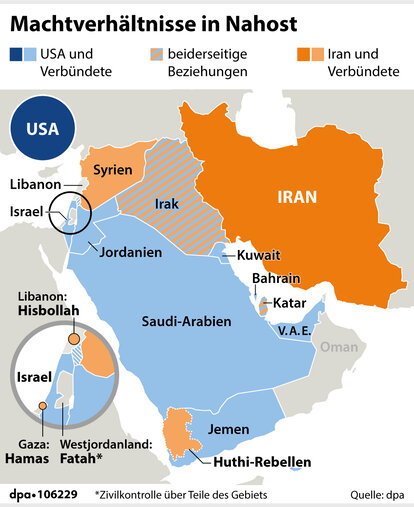
"Machtverhältnisse in Nahost: Verbündete USA/Israel, Verbündete Iran"; Grafik: A. Brühl, Redaktion: dpa
© picture alliance/dpa/dpa Grafik | dpa-infografik GmbHThe Palestinian question is back on the table – security is key
In 1977, Egyptian president Anwar Sadat was blamed for giving up the Palestinian cause, mostly by the Palestinians themselves, but also by a radical block of Arab countries. In 2020 the same voices, as well as Iran, criticized the UAE, Bahrain, Morocco and Sudan for normalizing relations with Israel. In 2023 the same criticism was aimed at Saudi Arabia that was in the process of negotiations with United States and Israel for a “Grand Deal”. But as a matter of fact, Sadat insisted on the “Autonomy plan” to be included in the Camp David Accords, the Emiratis demanded from Netanyahu stop the process of annexation of the West Bank and the Saudis insisted all along that it will be difficult to make progress without a political horizon for the Palestinians.
The role of moderate Arab states after the war
The question today is whether all of these countries can do more to again galvanize the process of peacemaking, negotiations and state-building in West Bank and Gaza. The question of regional participation is discussed now for over 20 years, since the day that crown-prince Abdullah Bin Abd al-Aziz put his “Saudi peace initiative” on the table of the Arab League. The initiative was never embraced by Israel, and it was also never strongly advanced by the Saudis and their Arab allies. The Arab world was busy with other problems: economic crisis, the Arab Spring, the rise of ISIS or youth unemployment. The Abraham Accords and the normalization agreement with Morocco indicated that the Arab world will not wait for Israelis and Palestinians to resolve their conflict. Neither did it want to be directly engaged with the ongoing struggle, distancing itself from any long-term problems such as the Hamas presence in Gaza, the confrontational regime of Abu-Mazen in Ramallah, the growing number of violent settler attacks in the West Bank and the unwillingness of Israel to do anything rather than “manage the conflict”.
Today, Gaza lies in ruins and the Hamas regime might be toppled soon. The West Bank is on fire following a sharp rise in Hamas’ popularity. We also see continued settler violence and sharp increase in military incursions. The Arab world needs to reassess their policy. Left alone, the humanitarian crisis in Gaza and turmoil in the West Bank will continue destabilizing the regime, playing into the hands of Iranians and their proxies.
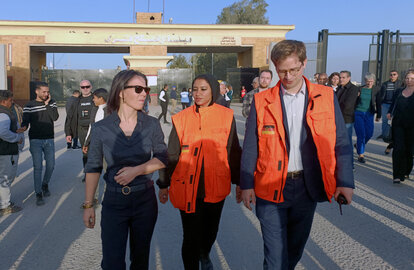
Die deutsche Außenministerin Annalena Baerbock (L) auf der ägyptischen Seite des Grenzübergangs bei Rafah zwischen dem Gazastreifen und Ägypten am 9. Januar 2024.
© picture alliance / EPA | STRThe necessity of a political perspective
After the war the moderate Arab states will have to invest more than just humanitarian aid: they would have to come in to fill at least some of the vacuum that would be left by Hamas and its Qatari backers. Not by governing Gaza, this mission would require a functioning Palestinian Autonomy to resume control of the strip, but by building a strong presence in the strip through charities, construction efforts, education systems and religious institutions. These states will also be forced to draw a red line for their relations with Israel – a political horizon for the Palestinians must be created, which means the return of the two-state solution. A solution flatly rejected by Netanyahu and his government.
The Saudi deal with Israel on hold, but not cancelled
The most intriguing country in this regard today is Saudi Arabia. Not because other countries are not important (the Egyptian role, for instance, cannot be overestimated for it holds the keys for the only crossing from Gaza to the outside world) but due to its status as the guardian of the holy places, the Arab Peace Initiative and the possibility that it still might normalize relations with Israel before the end of 2024. Throughout the crisis, the Saudis made sure to emphasize that the deal that was discussed prior to 07/10, was still on. After all, the “Grand Deal” also includes the US and if concluded, could achieve important Saudi goals, such as new weapon deals, a defense treaty and perhaps even a nuclear reactor. Also, there is no doubt that Hamas is no less an enemy of moderate Arab regimes, than of Israel as it tries to destabilize regional security and undermines governmental authority.
What needs to happen before this deal can be resumed? As it seems right now, a major change in the makeup of the Israeli government is necessary. The Saudis, as well as the Emiratis, have chosen moderation, making a significant effort to liberalize the public spaces in their respective countries and to fight radical Islamic currents. The violent and extreme nature of many members of the current Israeli government is appalling to decision makers in the Gulf. The dis-invitation of Netanyahu to Abu-Dhabi this January after Itamar Ben-Gvir, the minister of internal security, decided to go to the Temple Mount, was a first sign out of many that followed since. So unless there will be a profound change in Jerusalem, and it might take time, the deal might be put on hold indefinitely.
Foresight: The next war that is already in sight in the Middle East
The war with Hamas is not over yet, and the chances are that it will continue for many months in different modes and magnitudes. Yet the Arab states who normalized their relations with Israel know well that the Iranian allies of Hamas will continue with their effort to destabilize not only Gaza but other fronts as well. Despite Hamas’ cries for help, so far Hezbollah didn’t join the war: it keeps firing on Israeli military positions and sometimes also on civilian targets. Given its enormous rocket arsenal, it is clear that this is much less than what Hamas expected. During the last few years, all Israeli experts discussed the frightening scenario of the “First Northern war”, a war that will start from Lebanon and will stretch to Syria, and probably Iraq as well.
This war can start in two months or in two years, but in Israel many are convinced that it is inevitable and the only question is when it happens. The moderate Arab countries and Israel all recognize that Iran and its proxies are one of the main sources of regional destabilization (as of now the Iranian-backed Houthi rebels attack vessels near the strategic Bab al-Mandab straights), yet they differ in their approach to this problem: Israel has no other option than to fight the Iranian influence in Lebanon, Syria and sometimes Iraq, while many Arab states chose to reconcile with Iran, and focus on their ambitious economic plans.
The clandestine cooperation between security services is ongoing and it will continue to grow. At the same time, the moderate Arab states who also have commercial and diplomatic relations with Iran will try to prevent a war with Lebanon at all costs. Such a war could turn Lebanon into another Gaza, and the added threat to regional stability is expected to increase tensions between the different countries. The deterioration of the humanitarian situation in Gaza and the lack of functional government structure might also lead to strained relations between Israel and Egypt, especially if thousands of desperate Gazans charge the Rafah crossing into Egypt in attempt to leave the strip.
Only by changing the paradigm...to “moderates against radicals” can we narrow the widening gap between all sides

People-to-People-relationships key for creating lasting stability
It's currently unclear when the situation in and around Gaza will stabilize or when relations between the countries of the region will return to where they were prior to 07/10. However, it’s important to mention that as long as Israel doesn’t succeed in developing “People to People” relations with its Arab neighbors, including the Palestinians, it will be continue being surprised by angry, and often hateful reactions of the Arab street again and again.
Only through true integration of both Israelis and Palestinians in the wider Middle East network of moderate Arab states and joint work on conflict resolution while building healthy relations between civil societies may improve the current dynamics centered around specific military and businessmen working together. Governments do not know how to create these bonds, but civil society does and it should lead the way to a better version of the Middle East. Following the war in Gaza, there will be little appetite for peace building on either side, and that’s precisely why these relations should be encouraged and promoted. Only by changing the paradigm from “Arabs against Jews” or “Israelis against Palestinians” to “moderates against radicals” can we narrow the widening gap between all sides and work for true integration of Israelis and Palestinians in the wider Middle East.
Ksenia Svetlova is an executive director of ROPES (Regional organization for peace, economics and security), a non-resident senior fellow at the Atlantic Council and an ex-member of the Israeli Knesset.

